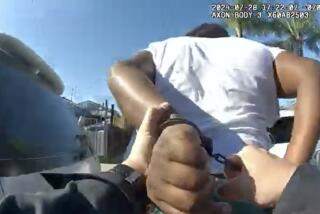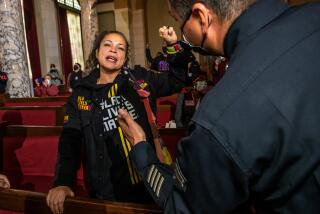Video of pregnant woman’s arrest stokes debate over police demands for ID
- Share via
Moments after she refused to identify herself to a Barstow police officer, Charlena Cooks, then eight months pregnant, found herself on the ground in handcuffs.
“Do not touch me,” she screamed in a video recording of the incident. “I am pregnant.”
As allegations of police overreach draw national attention, the video — captured on an officer’s body camera — along with a similar Barstow case involving two brothers who refused to show ID, raise questions about when police in California are entitled to ask for identification and when people can refuse to provide it. Civil rights advocates argue that police can’t force individuals to identify themselves without reason. Law enforcement groups, however, contend that officers investigating a potential crime can require identification.
The U.S. Supreme Court has upheld state laws that make it a crime to refuse to identify oneself when police ask. But California has no such law.
The ACLU of Southern California released the video of Cooks’ arrest last week. The release came on the heels of a settlement in a separate case against the city of Barstow involving questions over identification. In that case, two brothers were arrested for resisting a police officer last year after refusing to identify themselves.
In a statement Friday, Barstow spokesman Anthony Riley defended Cooks’ arrest, saying that she “actively resisted arrest.” A judge dismissed the charges against Cooks.
Riley also rejected an ACLU attorney’s suggestion that the arrest of Cooks, who is black, was racially motivated.
“The Barstow Police Department continues to be proactive in training its officers to assess and handle interactions with emotionally charged individuals while conducting an investigation, for the protection of everyone involved,” he said.
Cooks was arrested Jan. 26 after a school employee alleged that Cooks punched and threw an object at her car in the school parking lot.
Cooks, who was dropping off her daughter, denied attacking the woman and said it was she who felt threatened. The officer asked Cooks for her name, and she refused.
Cooks called her boyfriend to ask whether she had to identify herself. As she did, the officer approached Cooks, wrestled her to the ground and handcuffed her.
“Why are you resisting?” the officer asked.
In an interview, Cooks said that because of the incident, she worried about her daughter, who was born in March.
“I try not to obsess over watching her, but certain things that she does, I wonder, maybe the fall ... is that something that’s normal or is this just part of being a newborn?”
In the case of the brothers, Jesse and Robert Katz were at a restaurant when a customer began accusing other patrons and employees of stealing his vaporizer device.
Officers told the brothers that they needed to see identification, Jesse Katz said.
“We just told them I don’t see how that’s relevant to any investigation,” Katz said.
Prosecutors eventually dropped the criminal charges against the brothers. Under the settlement, the city paid the men $15,000 each and agreed to retrain officers to recognize that refusal to identify oneself is rarely grounds for arrest.
ACLU of Southern California staff attorney Adrienna Wong said that even if officers are conducting an investigation, they must have a reason to demand identification, such as when a driver is being booked.
“Officers in California should not be using the obstruction law, Penal Code 148, to arrest someone for failing to provide ID, when they can’t find any other reason to arrest them,” she said.
She acknowledged, however, that many officers disagree with that view.
Shaun Rundle, a government affairs and public safety specialist with the California Peace Officers Assn., said police can demand identification when they are conducting an investigation.
“Somebody has a right to not talk to a police officer if they’re just sitting on the street and are approached by someone with ‘I have a question,’ “ he said. “The public certainly do need to know their rights. But they need to know if they are being questioned by an officer usually that’s considered an investigation and they would have to identify themselves at that point.”
For breaking news in California, follow @VeronicaRochaLA.
ALSO:
Man accused of ordering murder of 17-year-old wife in 1992
Video shows man at Da Vinci apartment site at time of fire, source says
Chula Vista man suspected of killing neighbor commits suicide after standoff with SWAT
More to Read
Sign up for Essential California
The most important California stories and recommendations in your inbox every morning.
You may occasionally receive promotional content from the Los Angeles Times.










